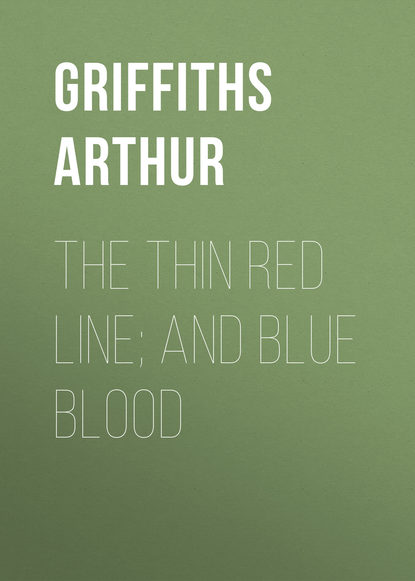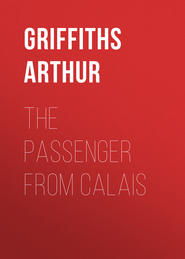По всем вопросам обращайтесь на: info@litportal.ru
(©) 2003-2024.
✖
The Thin Red Line; and Blue Blood
Настройки чтения
Размер шрифта
Высота строк
Поля
This blotting-book, with the same listless, aimless action, Mrs. Wilders presently turned to, and turned over the leaves one by one.
Between two of them she came upon a letter, left there by accident, or to be answered perhaps that day.
The feminine instinct of curiosity Mrs. Wilders possessed in no common degree. To look at the letter thus exposed, however unworthy the action, was a temptation such a woman could not resist. She began to read it, almost as a matter of course, but carelessly, and with no set purpose, as though it was little likely to contain matter that would interest her. But after the first few lines its perusal deeply absorbed her. A few lines more, and she closed the book, leaving her hand inside, and looked round the cabin.
Mr. Loftus and his assistants were still busily engaged upon their official task. Neither of them was paying the slightest attention to her.
With the hand still concealed inside the blotter, she folded up this missive which seemed so interesting and important, and, having thus got it into a small compass, easily and quickly transferred it to her pocket.
She looked anxiously round, fearing she might have been observed. But no one had noticed her, and presently, when Mr. Loftus had completed his work, they again left the yacht for the shore.
So soon as Mrs. Wilders regained the privacy of her own room at Misseri's, which was not till late in the day, she took out the letter she had laid hands on in the cabin of the yacht, and read it through slowly and carefully.
It was from Lord Lydstone's father, dated at Essendine Towers, the principal family-seat.
"My dear boy," so it ran, "your mother and I are very grateful to you for your very full and deeply interesting letter, with its ample, but most distressing, account of our dear Anastasius. It is a proud, but melancholy, satisfaction to know that he has maintained the traditions of the family, and bled, like many a Wilders before him, for his country's cause. His condition must, however, be a constant and trying anxiety, and I beseech you, more particularly on your mother's account, to keep us speedily informed of his progress. It is some consolation to think that you are by his side, and it is only right that you should remain at Constantinople so long as your brother is in any danger.
"But do not, my dear boy, linger long in the East. We want you back with us at home. This is your proper place—you who are our eldest born, heir to the title and estates—you should be here at my side. There are other urgent reasons why you should return. You know how anxious we are that you should marry and settle in life. We are doubly so now. Your brothers before this hateful war broke out made the succession, humanly speaking, almost secure. But the chances of a campaign are unhappily most uncertain. Anastasius has been struck down; we may lose him, which Heaven forbid; a Russian bullet may rob us any day of dear Hugo too. In such a dire and grievous calamity, you alone—only one single, precious life—would remain to keep the title in our line. Do not, I beseech you, suffer it to continue thus. Come home; marry, my son; give us another generation of descendants, and assure the succession.
"I have never made any secret of my wishes in this respect; but I have never told you the real reasons for my deep anxiety. It was my father's earnest hope—he inherited it from his father, as I have from mine—that the title might never be suffered to pass to his brother Anastasius's heirs. My uncle had married in direct opposition to his father's orders, in an age when filial disobedience was deemed a very heinous offence, and he was cut off with a shilling. I might say that he deserved no better; but he did not long survive to bear the penalty of his fault. He left a child—a daughter, however—to whom I would willingly have lent a helping hand, but she spurned all my overtures in a way that grieved me greatly, although I never openly complained. That branch of the family has continued estranged from us; and I am certainly indisposed to reopen communications with them.
"Yet the existence of that branch cannot be ignored. It might, at any time, through any series of mishaps of a kind I hardly like to contemplate, but, nevertheless, quite possible in this world of cross-purposes and sudden surprises, become of paramount importance in the family; for in point of seniority it stands next to ourselves. The next heir to the title, after you and your brothers, is the grandson of Anastasius Wilders, a lad of whom I know nothing, except that he is quite unfitted to assume the dignity of an Earl of Essendine, should fate ever will it that he should succeed. This unfitness you will readily appreciate when I tell you that he is at present a private soldier in a marching-regiment in the East. Stranger still, this regiment is the same as that in which poor Anastasius is serving—the Royal Picts. The young man's name is McKay—Stanislas Anastasius Wilders McKay. I have never seen him; but I am satisfied of his existence, and of the absolute validity of his claims. My agents have long had their eye on him, and through them I have full information of his movements and disposition. He appears a decent, good sort of youth. But I feel satisfied that we ought, as far as is possible by human endeavour, to prevent his becoming the head of the family.
"You are now in possession of the whole of the facts, my dear Lydstone, and I need scarcely insist upon the way in which you are affected by them. You will not hesitate, I am sure, after reading this letter, to return to England the moment you can leave your poor brother."
There was more in the letter, but it dealt with purely business matters, which did not interest the person who had become clandestinely possessed of it.
To say that Mrs. Wilders read this letter with surprise would inadequately express its effect upon her. She was altogether taken aback, dismayed, horror-stricken at its contents.
Now, when chance, or something worse, had cleared the way towards the great end, after which she had always eagerly, but almost hopelessly, hankered, a new and entirely unexpected obstacle suddenly supervened.
Another life was thrust in between her and the proximate enjoyment of high rank and great wealth.
Who was this interloper—this McKay—this private soldier serving in the ranks of the Royal Picts? What sort of man? What were his prospects—his age? Was it likely that he would stand permanently in her way?
These were facts which she must speedily ascertain. The regiment to which he belonged was in the Crimea, part of her uncle's brigade. Surely through him she might discover all she wanted to know. But how could this be best accomplished?
The more she thought over it, the more convinced she was that she ought to go in person to the Crimea, to prosecute her inquiries on the spot. While still doubtful as to the best means of reaching the theatre of war, it occurred to her that she could not do better than make use of Lord Lydstone's yacht.
It would have to go home eventually—to be paid off and disposed of by Lord Lydstone's heirs. But there was surely no immediate hurry for this, and Mrs. Wilders thought she had sufficient influence with Captain Trejago to persuade him, not only to postpone his departure, but to take a trip to the Crimea.
In this she was perfectly successful, and the day after Lord Lydstone's funeral the Arcadia, with a fine breeze aft, steered northward across the Black Sea.
It reached Balaclava on the morning of the 5th of November, and Mrs. Wilders immediately despatched a messenger on shore to inform the general of her arrival. That day, however, the general and his brigade were very busily employed. It was the day of Inkerman!
CHAPTER XVI.
"HARD POUNDING."
Mr. Hobson, as he called himself, had been perfectly right when he gleefully assured Mrs. Wilders that the Russians were gathering up their strength for a supreme effort against the allies. Reinforcements had been steadily pouring into the Crimea for weeks past—two of the Czar's sons had arrived to stir up the enthusiasm of the soldiers. Menschikoff, who still commanded, counted confidently upon inflicting exemplary chastisement upon the invaders. He looked for nothing less, according to an intercepted despatch, than the destruction or capture of the whole allied army.
No doubt the enemy had now an overwhelming superiority in numbers. The total land forces under Prince Menschikoff's command, including the garrison of Sebastopol, were 120,000 strong. Those numbers included a large body of cavalry and a formidable field artillery.
The entire allied army was barely half that strength. It was called upon, moreover, to occupy an immense front—a front which extended from the sea at Kamiesch to the Tchernaya, and from the Tchernaya, by a long and circuitous route, back to the sea at Balaclava. This line, offensive as regards the siege-works, but defensive along the unduly extended and exposed right flank at Balaclava, was close on twenty miles. The great length of front made severe demands upon the allied troops; it could only be manned by dangerously splitting up their whole strength into many weak units, none of which could be very easily or rapidly reinforced by the rest.
Perhaps the weakest part of the whole line was the extreme right, held at this moment by the British Second Division. Here, on an exposed and vitally important flank, the whole available force was barely 3,000 men. For some time past it had been intended to fortify this flank by field-works, armed with heavy artillery. But, although the necessity for protecting it was thus admitted, the urgency was not exactly understood, or at least was subordinated to other operations; as a matter of fact, this flank was "in the air," to use a military phrase, lying quite open and exposed, with only an insufficient, greatly harassed garrison on the spot, and no supports or reserves near at hand.
The utmost assistance on which this small body could count, as was afterwards shown, under stress, too, of most imminent danger, was 14,000 men. Not that all these numbers were fully available at any one time; they were constantly affected and diminished by casualties in the height and heat of the action; so that never were there more than 13,000, French and English, actually engaged.
On the other hand, the Russian attacking force was 70,000 strong, and they had with them 235 guns.
It was in truth another battle of giants, like Waterloo. "Hard pounding," as the great duke said of that other fight; a fierce trial of strength; a protracted, seemingly unequal, struggle between the dead weight of the aggregate many and the individual prowess of the undaunted, indomitable few.
The enemy's plan of action had been minutely and carefully prepared. We know it now. He meant to use his whole strength along his entire front—in part with feigned and deceiving demonstrations to "contain" or hold inactive the troops that faced him, in part with determined onslaught, delivered with countless thousands, in massive columns, against the reputed weakest point of our line.
This plan Menschikoff hastened to put into execution. Time pressed: the enemy had learnt through spies that an assault on Sebastopol was close at hand. Besides, the Grand Dukes had arrived, and the troops, worked up to the highest pitch of loyal fanatic fervour, were mad to fight under the eyes of the sons of their father, the holy Czar.
Dawn broke late on that drear November morning: November the 5th—a day destined to be ever memorable in the annals of British arms: a dawn that was delayed and darkened by dense, driving mists, and rain-clouds, black and lowering.
Nothing, however, had broken the repose of the British camp, or hinted at the near approach of countless foes.
The night had been tranquil; the enemy quiet; only, in the valley beneath our pickets on the Inkerman heights, some sentries had heard the constant rumbling of wheels, but their officers to whom they reported did not interpret the same aright, as the movement of artillery.
An hour or more before daylight the church-bells of Sebastopol rang out a joyous peal. Why not? It was the Sabbath morning. But these chimes, alas! ushered in a Sunday of struggle and bloodshed, not of peaceful devotion and prayer.
The outlying pickets had been relieved, and were marching campwards; the Second Division had had its customary "daylight parade"; the men had stood to their arms for half-an-hour, and, as nothing was stirring, had been dismissed to their tents; the fatigue-parties had been despatched for rations, water, fuel—in a word, the ordinary daily duties of the camp had commenced, when the sharp rattle of musketry rang out angrily, and well sustained in the direction of our foremost picket on Shell Hill.
"That means mischief!" The speaker was General Codrington, who, according to invariable rule, had ridden out before daylight to reconnoitre and watch the enemy. "Halt the off-going pickets; we may want all the men we can lay hands on."
Then this prompt and judicious commander proceeded to line the Victoria ridge, which faced Mount Inkerman, with the troops he had thus impounded, and galloped off to put the rest of his brigade under arms.
The firing reached and roused another energetic general officer, Pennefather, who now commanded the Second Division in place of De Lacy Evans.
"Sound the assembly!" he cried. "Let the division stand to its arms. Every man must turn out: every mother's son of them. We shall be engaged hot and strong in less than half-an-hour."
As pugnacious as any terrier, Pennefather, with unerring instinct, smelt the coming fight.
His division was quickly formed on what was afterwards called the "Home Ridge," and which was its regular parade-ground. But the general had no idea of awaiting attack in this position. It was his plan rather to push forward and fight the enemy wherever he could be found. With this idea he sent a portion of his strength down the slope to "feed the pickets," as he himself called it, whilst another was advanced to the right front under General Wilders, and with this body went the Royal Picts. The Second Division benefited greatly by this advance, for the Russians were now absolute masters of the crest of the Inkerman hill, where they established their batteries, and poured forth volley after volley, all of which passed harmlessly over the heads of our men. Meanwhile the alarm spread. A continuous firing, momentarily increasing in vigour, showed that this was no affair of outposts, but the beginning of a great battle. The bulk of the allied forces were under arms, and notice of the attack had been despatched to Lord Raglan at the English headquarters.
In less than a quarter-of-an-hour, long before 7 a.m., Lord Raglan was in his saddle, ready to ride wherever he might be required most.
But whither should he go? The battle, as it seemed, was waging all around him, on every side of the allied position. A vigorous fire was kept up from Sebastopol; down in the Tchernaya valley the army, supposed to be still under Liprandi, but really commanded by Gortschakoff, had advanced towards the Woronzoff road, and threatened to repeat the tactics of Balaclava by attacking with still greater force the right rear of our position; last of all, around Mount Inkerman, the unceasing sound of musketry and big guns betrayed the development of a serious attack.
Lord Raglan was not long in doubt. He knew the weakest point of the British position, and rightly guessed that the enemy would know it too.
"I shall go to Inkerman," he said. "That is their real point, I feel sure. And we must have up all the reinforcements we can muster. You, Burghersh, tell Sir George Cathcart to move up his division and support Pennefather and Brown. You, Steele, beg General Bosquet to lend me all the men he can spare."
Pennefather had his hands full by the time Lord Raglan arrived. With a paltry 3,000 odd men he was confronting 25,000; but, happily, the morning was so dark and the brushwood so thick that his men were hardly conscious that they were thus outnumbered.








